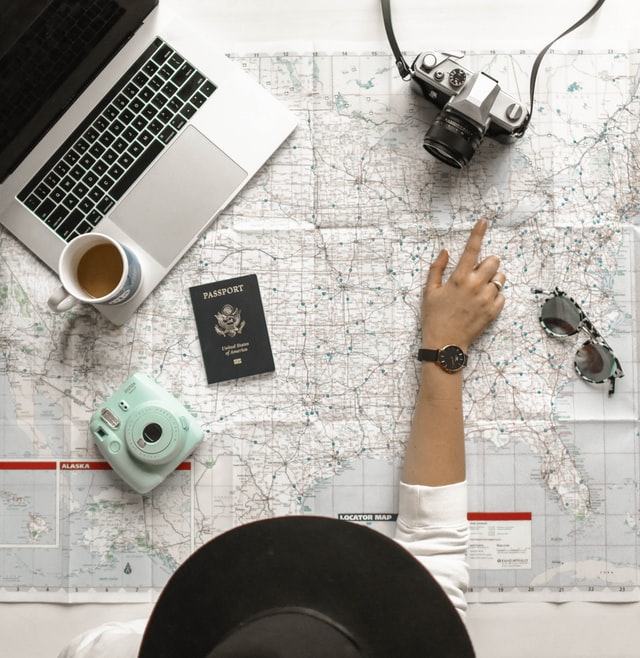Traveling is expensive, especially if you have to fly a long distance to get to your destination. You have to pay for transportation, lodging, food, and any activities or excursions you want to enjoy. While the costs add up, it doesn’t mean you have to forgo your dream vacation and negate aspects of your trip to save a few bucks. There’s a thing called budget travel, and it’s a game-changer! Using travel hacks, you can save a ton of money to book the trip you’ve always wanted. However, there are a few things to consider first, and it starts with an honest conversation.
What’s your travel budget?
You don’t want to go into debt to travel, and honestly, you don’t have to. There are myriad ways to save, but the first thing you have to consider is your budget. How much, realistically, can you spend on a trip?
One way to look at budgeting is telling yourself you don’t care how much it costs; you’ll wait and save. Another way is looking at your monthly expenses and deciding how much you can realistically put aside. In either scenario, you need to know how much money you have and where it’s going each month.
If budgeting isn’t your thing, try making a spreadsheet to get started. Take one to three months and write down every penny you accrue and spend. Really look at where your money is going. After paying all the necessary bills, buying food, and paying for items such as gas or commuter fees, what are you left with and why?
Next, assess the “why”. Are you eating out for several meals a day? Buying coffee each morning? Stress shopping online for things you may not need? These questions aren’t meant to shame you. They are merely here to help you wrap your mind around where your money is going because if you want to take that dream trip, every penny counts.
Finally, how much can you realistically save after paying bills? And when do you want to leave? Once you know a possible date and a number, you can start planning. Put a little aside each month, save that bonus check, and earmark your tax refund as the start to your travel fund. Once you know the number and how much time you have, break down your “payments” into a monthly expense and get ready to board that plane!
Selecting a location
Once you know how much you can spend, it’s time to decide where you want to go. Maybe you have one location in mind, such as the Maldives, Switzerland, St. Lucia, Iceland, or New Zealand. These locations are high on the pricing list, so if that’s the case, you may need to spend more time saving those pennies. However, maybe you enjoy backpacking and want to see an array of places when you hit the road. Locations like Romania, Thailand, Indonesia, Morocco, and Costa Rica have a cheaper cost of living, and based on your country’s conversation rates, you’ll most likely be able to spend more time in those locations. Don’t shrink your dream trip because of the price. Just remind yourself that you have to be able to afford a place to sleep, food at the location, and any activities you wish to enjoy.
When considering a travel destination, especially with budget travel, you want to think about what I call the give/get ratio. Ask yourself: What will I get at this location for the amount of money I’m going to give? I could probably afford three nights in the Maldives at a beautiful resort. However, for the same amount of money, I could also backpack around the islands of Thailand for two weeks. This piece of the puzzle is solely dependent upon the way you like to travel, the amenities you need, and the length of time you have to go.
Just like setting a budget, setting a location also takes an honest conversation. Are you up for sleeping in hostels, or do you want a nice hotel room? Do you care if your room has modern amenities, or are you focused on spending your money on excursions? Once you know your budget, you can decide where you fall in the give/get ratio and start planning that dream trip. Sometimes it’s worth spending a little extra for those creature comforts but remember: it all adds up.
One last thing to consider when selecting the location is the time of the year. Are you trying to travel during the peak season? You may be beholden to certain travel dates based on your career or other obligations, but traveling in the winter months, off-season, or shoulder seasons is a great way to save. Peak seasons mean peak prices!
Playing the points game
The number one way to budget travel and hack the system is by using credit cards. However, there are a few things to consider before you start this game.
- Do you have good credit? Most airlines, hotels, and travel credit cards require at least a 700 credit score to cash in on the deal. If you’re not there yet, don’t sweat it. Start with one card, pay off your balances completely at the end of each month, and your credit score will grow in no time.
- Are you good with money? Some people struggle with credit cards because they aren’t great at having a larger spending limit. If this is the case, don’t put yourself in a precarious situation by using credit cards. If you are in debt or struggle to make minimum loan payments, this may not be the right option for you. Save cash instead and focus on your magic number.
- How much money do you spend each month? To get the sign-on bonuses that make these cards worth it, you typically have to spend 2k to 4k in a three-month period. These numbers seem like a lot, but if you can put any or all of your monthly bills on your card, you can hit that number in no time.
Take some time and assess the answers to these questions. Credit cards aren’t for everyone, but if you can tackle these three areas, the points game is your next step to successful budget travel. If credit cards don’t work for you, decide on an amount of money to save each month and hide it from yourself. Put it in an account you can’t easily access and let the savings begin!
Airline miles
For most dream trips, getting to your destination will be a big-ticket item. This is where you can really capitalize on the miles programs of major airlines. Once you pick a location, start researching airlines that fly there and do so often. The more an airline flies to a hub, the cheaper the price will be.
Next, select your airline. From here, you can determine the right card for your needs. Some airlines partner directly with a credit card company, such as Delta with American Express and JetBlue with Barclay. Other cards, such as Chase, allow you to book with any airline through their portal. However, terms and conditions always apply, which means you must take the time to read the fine print or call a representative to answer your questions. You also want to see which airlines are partnered to give you the most bang for your buck when it comes to traveling. All airlines have sister companies that share planes and bookings.
Lastly, review your options. Some months, companies give away huge mile sign-on bonuses while others may be far lower. Take a few months and compare the offers. Your goal is to get a free round-trip flight to your destination just by signing up for a credit card. Sometimes you have to let it ride and wait it out. If you know someone with one of these cards, ask for a referral code. That way, you both cash in!
Credit card points
Credit card points work the same way as airline miles, but there are more reward options on the other end of the points. You can get hotel rooms, rental cars, vacation packages, and so much more. Each time you use your card, you are adding to that vacation, which is why you want to put everything on the card you possibly can. Set up autopay and tackle all your major expenses with your card. If you have a partner, get a second card with the same number and work together to score those points. Each time you swipe, you’re one step closer to your dream trip.
Most credit cards also feature monthly deals, such as multiplied points at certain restaurants, gas stations, and retail establishments. If you can pay attention to these deals, you can literally make money just by buying groceries or getting gas. It really is that easy!
Loyalty and rewards programs
In connection to credit card points, signing up for loyalty programs is a quick way to make travel bucks. For example, selecting a hotel chain, becoming a rewards member, and opening their credit card is a great way to get free rooms. Cards such as Hilton by American Express and Marriott by Visa offer over 100,000+ points for most new cardholders. Depending on where you stay, that can add up to a week’s worth of rooms. And every time you stay with that chain, you build more points and more free items.
If you can stick with one major hotel chain and one major airline, your loyalty will build and you’ll receive more deals as you travel. However, take the time to do the research first and decide which cards/companies make sense for your needs.
Other budget travel options
Speaking from experience, these hacks don’t always work out in your favor, but there are other ways to save. Skyscanner is a website that assesses all flights based on the dates you choose. It’s a great starting point for cheap airfares, but be sure to read the fine print about “self transfers” and baggage options.
Travel sites like Expedia and Booking.com also feature great deals and loyalty programs that typically include free breakfast, and they usually have pretty cheap rental car options. Take some time and shop around. Sometimes these budget sites have the best deals!
Putting your budget travel trip together
Okay, so you have a budget, a location in mind, and you’ve figured out some ways to get there. Now it’s time to put the trip together. There are a few things you want to consider before you book.
- Flights: You want to save your money for this item, but there are also ways to save here by taking some time to research. If you can’t use points, Black Friday/Cyber Monday are great times to buy flights (and hotels). Prices are slashed and a lot of fees are dropped. However, when booking, make sure you are okay with the time between flights if you have to make a connection and that your bags are covered. It’s never cool when you show up at the airport and you have to pay a $50 bag fee.
- Location: What are you planning on doing during this trip? If the answer is sightseeing, you want to stay in a relatively central location where you can walk to major landmarks and/or grab the transit system without having to rent a car. This will save you a lot of money in the long run if you can forgo cabs and rentals.
- Lodging: Choosing an accommodation can make or break a budget. The best option is hostels, as they are centrally located, have cheap rates, and offer a lot of free amenities. Even if you don’t feel comfortable in the dorms, you can get a private room. Hostels are great because you can meet like-minded travelers, cash in on free tours, get drink/food specials, and usually get a free breakfast included in the price. If this option isn’t for you, consider using your credit card points or looking at Airbnb-style accommodation. Sometimes, it’s way cheaper to rent an apartment for a week than it is to stay at a hotel. At the very least, try and get a free breakfast built into the price. The less you pay on-site, the better. Take your time and scour that Google map with the “Hotels” icon before you make any decisions, then check out hostels.com and Airbnb to research your stay. Quick tip: Check to see if your lodging option has heat/AC. You’d be surprised how many don’t.
- Inclusions: As I previously mentioned, having amenities included, such as breakfast and shuttles, can help you save in big ways. Weigh your options when it comes to inclusions. The more the accommodation can offer, the more you can save while you’re on your trip. However, sometimes sites like Booking.com tell you how much more breakfast will cost. If this is the case, you might be better off eating at a local cafe in the morning instead. Take your time and compare everything you find.
- Connections: If you’re planning on backpacking, plan out the connecting travel before you go. Check out the public transit systems, book your flights ahead of time, and figure out if and when you’ll need higher-priced transportation, such as a car or taxi. Sometimes it’s possible to book those in advance for a flat rate.
This may seem overwhelming, but once you get the hang of budget travel, it’s a lot of fun to plan your trips! I always create a Google doc and use it as a running draft to keep track of flight deals, lodging, and pricing, along with local neighborhood details and attractions. Link your findings to the doc and take your time to research all your options. After a month or so of researching, look at what you’ve found and put the puzzle together!
Final thoughts
When you get the hang of it, budget travel is easy and accessible, but putting together a trip is a lot of work. While these budget travel hacks will save you money, they won’t save you time. That’s why TourHero exists! We are here to help you plan the trip of a lifetime without breaking the bank. Reach out to us today and let us help you get to where you want to be!
About TourHero
TourHero is a social travel platform that enables you to travel with like-minded people and fall in love with the journey. We work closely with handpicked local operators to ensure every experience curated is unique and exclusive to your travel group. Come with us on epic adventures and create memories that last a lifetime. Get started here!










